National Theatre of Scotland fights back with Scenes for Survival
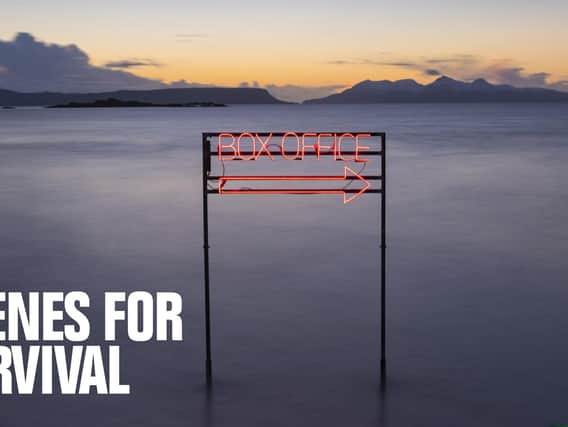

The country’s creative talent are all in lockdown like the rest of us but that hasn’t stopped them making a welcome drama out of the corona crisis. With theatres closed, they are responding to Covid-19 in the way they do best; writing, acting, filming remotely and working in collaboration to release their work online in the shape of Scenes for Survival, the National Theatre of Scotland’s digital response to the crisis.
Launched this week it was created in association with BBC Scotland, Screen Scotland, BBC Arts’ Culture in Quarantine project and theatre venues and companies, with support from Hopscotch Films, and has already seen short pieces broadcast from writers Janey Godley, Jenni Fagan, Morna Pearson, Ian Rankin and Stef Smith, as well as an extract from Frances Poet’s Fibres.
Each is made by a quarantine creative team, connecting remotely, comprising a performer(s) – including Brian Cox, Kate Dickie, Moyo Akandé, Ashleigh More, Janey Godley, and Jonathan Watson, many filming themselves at home, and a writer and director.
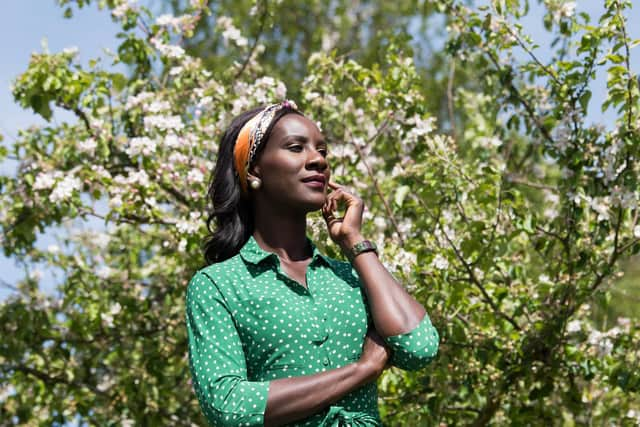

Jackie Wylie, artistic director of the National Theatre of Scotland says, “In Scotland during times of crisis we have always turned to our storytellers to offer connectivity, solace and joy. We want to bring audiences together online despite our collective isolation.”
A showcase of homegrown talent, there will be more than 40 films in total, all free, released over the coming weeks and months on www.bbc.co.uk/scenesforsurvival and www.nationaltheatre scotland.com/scenes forsurvival, and a selection will also be broadcast on BBC Scotland, BBC4 and BBC Alba.
As well as entertaining us, and encouraging new ways of working, the shorts will help raise funds for the industry’s struggling workforce, many of them freelance, through the new Scenes For Survival Hardship Fund.
“These stories begin to help us understand the times we are living through and how to collectively imagine our futures. We hope that audiences will find some joy, shared community and solace in watching these Scenes whilst raising funds for theatre workers in need,” says Wylie.
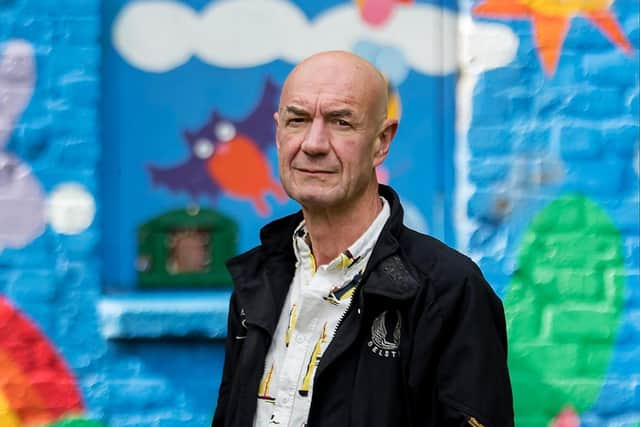

“We will all feel changed by what we have been through and it is theatre that will allow us to imagine, with hope, where we are going to find ourselves and how it will feel. Theatre matters, more than ever.”
Scenes for Survival including The Present can be watched on www.bbc.co.uk/scenesforsurvival and www.nationaltheatre scotland.com/scenes forsurvival. Venus As A Boy and The Domestic will be available this week
FOUR OF THE ARTISTS INVOLVED GIVE US AN INSIGHT INTO THEIR LOCKDOWN AND SCENE FOR SURVIVAL.
xxxxxxxxxxxxxxxxxxxxxxxxxxxxxxxxxxxx
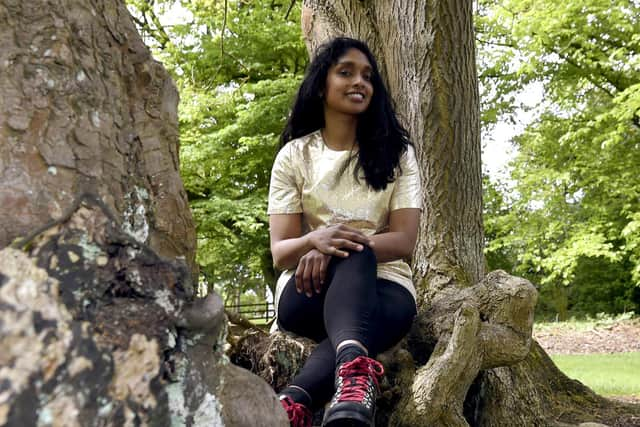

STEF SMITH
Stef Smith has written The Present, directed by Katherine Nesbitt, and performed by Moyo Akandé, produced in association with the Traverse Theatre. It sees a young woman in lockdown alone, lamenting an absent loved one and imagining a time when they can be together.
Tell us about The Present.
I wanted to keep my piece relatively simple and give an accessible and honest reflection of lockdown. I know early on I threw myself into tasks – cleaning and organising – but as lockdown has continued the rhythm of our lives has changed. This piece is much gentler and more hopeful than my work usually is, but I think that is just where my heart and mind was at when I began writing.
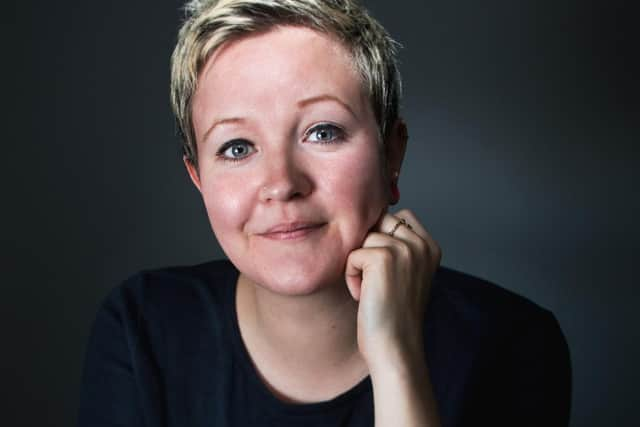

What is it like writing in isolation?
On a practical level, writing in lockdown is not that different. I am sitting alone at my desk. Although I miss the distraction of coffee shops and walking with abandon – integral to my process, even if they seem like procrastination. But emotionally it is very different – there is a lot of collective cognitive noise and anxiety to try and hold at bay if you are to work on projects not linked to lockdown.
Some days it feels impossible to write, other days I can disappear into work.
How has the lockdown affected your other work?
The final week of Nora’s run at the Young Vic has been cancelled and my new adaptation of Antigone due to open at Guildhall (directed by Orla O’Loughlin) placed on hold, indefinitely. I also had a TV series in early development which was about a pandemic and for now had to be shelved.
How has lockdown changed your life?
I will never forget lockdown; I don’t think many people will. It’s part of our collective political, social and cognitive DNA.
Are there any changes you will take forward?
I hope to spend more time with loved ones. And with consent, my hugs will probably last a little longer – and I was already fond of a long hug.
How do you think the arts and entertainment industry will change?
Until a vaccine is available, theatre will have to fundamentally change because of the way we will have to organise audiences. Live music and comedy will change too. It’s impossible to know what the future looks like and I do my best to maintain a balance of optimism and realism.
Due to money and resources I think TV and film will find a way to get going quicker – with closed sets and cast and crews isolating together.
What have you learnt in lockdown?
That not even an end-of-the-world pandemic makes me want to do a jigsaw.
What have you been watching, reading, and listening to?
I watched the TV series The Leftovers and was gripped from the start. It’s adapted from a book about what happens when two per cent of the population disappears in a split second. The parallels of that – written over two years ago – to now are eerie.
xxxxxxxxxxxxxxxxxxxxxxxxxxxxxxxxxxxx
MOYO AKANDE performs The Present
What is your Scene about?
It explores a young woman’s life in solitude during the lockdown. She offers a tender poetic lament to an absent loved one and imagines a time when they can be together again. Stef’s piece is beautiful and full of nostalgia.
What is it like performing in isolation?
A unique and challenging experience that couldn’t have come along at a better time as most work opportunities have come to a complete standstill.
The best part was that even in isolation, it was possible to creatively collaborate with an exceptional team of women and bring a piece of work to life without physically being in the same room. What made the experience even more enjoyable was the challenge of capturing Stef’s piece through the medium of film. Filmmaking is an area I’m passionate about and currently involved in, so myself and Katherine dived straight in and loved every minute of working together in this unique way.
What are the constraints of performing in lockdown?
In the filmmaking industry there are a lot of moving parts. In order to execute and complete a scene on set, a crew is required – director, assistant director, cinematographer, camera operator, boom operator/sound mixer, focus puller, gaffer, key grip, and hair/make-up. Without any of these it becomes challenging to produce film. But I feel as a creative we strive when we have limited resources and our imagination helps us to overcome constraints. I was not only the performer, but managed to fill the role of the important moving parts that make film possible, despite the technical difficulties.
Have you done your own make-up and costumes, or had help from your household?
I didn’t have any major help but with framing scenes there was one overhead shot that was very tricky on my own. I designed my set, framed the camera shots Katherine had set out, set up the lighting, made sure my mic was always on and working at the right level, did my own make-up and hair, and sourced my costume from my clothes, all while trying to remember the lines!
How has the lockdown affected your other work?
I was performing in the play, The Special Relationship at The Soho Theatre in London, when the lockdown was announced and led to it being forced to close a week early. It was very sudden and came as a huge anti-climax.
Overall film, television and the theatre industries have all been badly affected. The future feels uncertain for everyone in the arts, however, I think we can reflect on this experience and work together to make engaging content that helps everyone affected.
How has lockdown changed your life?
Lockdown has made me live in the present. I can sometimes catch myself focusing on the future which really isn’t helpful. This situation is out of my control, so I’m learning to fully embrace the unknown and take stock of what’s really important; family, friends and good health. I’m trying to enjoy the small and simple things in life we sometimes take for granted.
Are there any changes you will take forward?
I’m going to slow down a little and spend more time just being still. I was always on the go and maybe giving too much of my attention to certain aspects of my life that now don’t really matter. It’s been a nice reflective period. So I’m embracing enjoying my own company and being creative in different ways.
How do you think the arts and entertainment industry will change?
It’s already changing dramatically. Many established theatres have gone into administration and will continue to do so due to social distancing measures. Of course we need to protect the public, our health comes first and the NHS workers on the frontline have gone above and beyond to protect the nation. This means everyone will have to work through this situation for the greater good.
This has led to thinking outside the box, to experiment, plan, and perform in alternative ways, such as the NTS’s Scenes for Survival.
Even in isolation theatre still brings people together, which is a beautiful thing. It’s great that we can continue to entertain audiences and deliver messages of solidarity and hope.
How will coronavirus change the way we write/act/view performance?
Many theatre productions are streaming past works or recent productions that closed early. Online streaming could be a way forward for viewing performances if it proves profitable.
Writers live pretty solitary lives anyway, but the great thing is, we now have more time to create and still have work commissioned. I think now is the age of the writer.
What’s the last thing you laughed at?
The Government’s Self Employment Income Support Scheme.
What’s your best tip for staying sane?
Take each day as it comes. Remind yourself of the wonderful things in your life. We are social by nature so it’s important to have someone to talk to; a neighbour, customer in the shopping queue, obviously two metres apart, to ease boredom and social anxiety. Nobody anticipated 2020 would turn out like this. Things really can’t get any worse, only better. I do believe the days will get brighter soon.
What have you been watching, reading, and listening to in lockdown?
I’ve been binge watching season two of Succession starring our very own Brian Cox. It’s an American satirical-comedy drama that is superbly written. Brian gives a stellar performance and I’m hooked.
I’m halfway through Michelle Obama’s autobiography Becoming, a powerful and inspiring memoir that explores how she steadily defied expectations to become the incredible woman she is.
Finally, why should we watch Scenes for Survival?
Because it will help draw attention to the enduring and urgent role of storytelling.
It will also raise money for artists and theatre workers hardest hit. All the content will be free and it’s an entertaining way to bring everyone together.
xxxxxxxxxxxxxxxxxxxxxxxxxxxxxxxxxxxx
TAM DEAN BURN
What are you doing for Scenes?
An excerpt from Venus As A Boy by Luke Sutherland. I adapted his novel into a one man show for NTS in 2007 and toured it following the story’s journey from St Margaret’s Hope in the Orkney Isles to Soho in London. Luke toured with me playing a score he created. He has composed a piece for the scene too.
The scene is a last message to camera from the main character in Venus who is dying, he believes, because he is turning to gold.
What are the constraints of performing in lockdown?
One of the constraints is fitting filming into our day whilst my partner works in the kitchen and our daughter does her home schooling in the living room. Luckily it’s a scene on a bed I’m shooting!
Have you done your own make-up and costumes, or had help from anyone in your household?
I’m only wearing pants so it’s just been a matter of choosing white or black ones. I’m experimenting with different make-up to bring a little gold sparkle to the scene. Some just arrived so I’m looking forward to trying them out.
How has the lockdown affected your work?
I’m having to rethink a play I’ve written and another novel adaptation. Both could perhaps benefit in some ways from the constraints, at least by beginning as online performances.
How has lockdown changed your life?
In many ways it’s similar to the fairly isolated life I led beforehand apart from the daily school pickup. But of course it has fundamentally changed things in ways we can’t even fully appreciate yet.
Are there any changes you will take forward?
Having had pneumonia every year as a small child and an inherent weakness in my lungs I’m going to be very wary of exposing myself to the virus until there is a cure or vaccine.
How will coronavirus change the way we write/act/view performance?
Like with everything else, it will hopefully change us for the better in realising what is actually important and vital in life to face the even bigger challenges of climate change, which unlike the virus, we won’t get over if we don’t find world solutions fast.
What have you learnt in lockdown?
That more than ever we cannot afford capitalism any longer and that the world’s working class has the task of moving beyond it to a sustainable system that works in harmony with the rest of nature. That must begin with what’s abundantly clear from this crisis – we need workers to be in control of things, to put people and nature before profit.
What have you been watching, reading, and listening to?
We totally loved the series Babylon Berlin and Disney plus couldn’t have come at a better time! I’ve been sent some tracks by musician friends to put words to and I’ve begun reading/writing on a mosaic of memories.
Where would you like to be right now?
I’m totally happy where I am right now and wouldn’t wish to be anywhere else except right in the midst of the socialist revolution but maybe that’s exactly where we are!
xxxxxxxxxxxxxxxxxxxxxxxxxxxxxxxxxxxx
UMA NADA-RAJAH
Uma Nada-Rajah has written The Domestic, a darkly comic short play about the impulse to care for one another, which she has dedicated “to the domestic service staff of the NHS for their unseen role in patient care”.
How has the lockdown affected your work?
My day job is as a staff nurse in an NHS hospital. The pandemic has only exacerbated pre-existing social inequalities. Hearing the stories of my nursing colleagues in America has strengthened my belief that universal health care is the most civilised facet of our society.
The clapping is lovely, but part of me worries that it is an ingenious piece of Tory choreography designed to distract from a decade’s worth of under-funding of the health service. We’re a bit protected from that in Scotland. But with US-UK trade talks currently back underway, let’s not all be clapping so loudly that the NHS is sold out from under us.
What is it like writing in isolation?
I normally write at the public library and with the price of a coffee in town can only afford one a day, so I’ve been giving myself the jitters drinking far too much of it. I experimented with biting into chillies as an alternative form of stimulant but soon came to realise this was just a painful form of procrastination.
What are the constraints of writing in lockdown?
It’s more difficult to get my finger on the pulse. I miss random encounters like when a stranger at a bus stop tells you their life story and you end up back at theirs drinking Lambrini and eating ginger snaps. Cannae do that on Zoom.
How has lockdown changed your life?
I’ve started to stockpile red wine.
Are there any changes you will take forward?
As a person of minority ethnic heritage, I’ll be keeping an eye on the research, but taking a Vitamin D supplement in the interim. (Nudge all your BAME friends!)
What have you learnt in lockdown?
A study from the University of Kent found that eight out of ten care workers in Britain do not believe they will be paid a wage if they self-isolate. That’s an utter disgrace.
What’s your best tip for staying sane?
I was reading that in Mao Tse Tung’s China, suffering from poor mental health was viewed as a ‘deficiency of revolutionary zeal’, easily fixed by re-invigorating your faith in the state. It’s absurd, but a nice thought that your acute psychosis or chronic depression can be cured with a pitch perfect rendition of the national anthem.
The ‘leader of the free world’ has suggested we inject ourselves with household disinfectant. People with the greatest political power have abandoned the notion of an objective reality. I think it’s all right to feel unsettled. Perhaps we should use this time to ask deeper questions about the kind of world we want to live in and the lives we want to live.
What have you been watching, reading, and listening to in lockdown?
I’ve been re-watching The Wire and dipping into Ken Loach’s back catalogue and I’m reading Kafka’s Investigations of a Dog and Other Creatures and have pre-ordered The Vanishing Half by Brit Bennett. I’m listening to the Blindboy podcast and a Bahamian musician called Exuma.
Where would you like to be right now?
New York in the late 1920s, on the cusp of the Harlem Renaissance, dancing in Club Hot-Cha, where it all kicks off at three in the morning.
Finally, why should we watch Scenes for Survival?
You can watch it in your jammies and will save a fortune at the snack kiosk.
Scenes for Survival including The Present can be watched on www.bbc.co.uk/scenesforsurvival and www.nationaltheatre scotland.com/scenes forsurvival. Venus As A Boy and The Domestic will be available this week
xxxxxxxxxxxxxxxxxxxxxxxxxxx
A message from the Editor:
Thank you for reading this story on our website. While I have your attention, I also have an important request to make of you.
With the coronavirus lockdown having a major impact on many of our advertisers - and consequently the revenue we receive - we are more reliant than ever on you taking out a digital subscription.
Subscribe to scotsman.com and enjoy unlimited access to Scottish news and information online and on our app. With a digital subscription, you can read more than 5 articles, see fewer ads, enjoy faster load times, and get access to exclusive newsletters and content. Visit https://www.scotsman.com/subscriptions now to sign up.
Our journalism costs money and we rely on advertising, print and digital revenues to help to support them. By supporting us, we are able to support you in providing trusted, fact-checked content for this website.
Joy Yates
Editorial Director